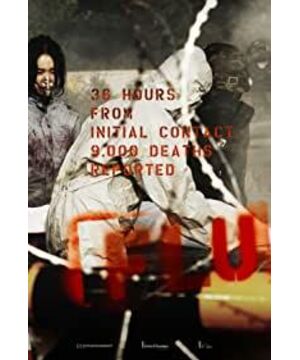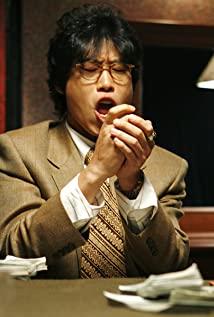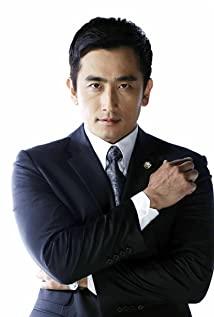The source of disaster is driven by interests, but human nature is the eternal theme. The source of the epidemic in the movie is the smuggling of Southeast Asians to earn money. The source of the epidemic in Wuhan this time is wild animals, for the so-called "deliciousness" and "nutrition" that are not there. They reach the same goal in different ways, and ultimately harm others and themselves. But in times of disaster, the weaknesses of human nature are more vividly displayed. Regarding Snyder's insistence on killing the sick South Koreans and even dispatching bombers, but the South Korean soldiers deliberately missed, I think this issue is related to "empathy". We all know that empathy is the ability to be aware of the feelings and situations of others. In the face of disaster, only by experiencing the pain and difficulty of others can we be more tolerant and understanding. But does having empathy really make people better off during a pandemic? Or can empathy really make this society and this world a better place? The magazine Scientific American, published in January 2020, answered this question, and Scott Kaufman, a well-known psychologist at Columbia University, made a point: the proliferation of empathy is not necessarily a good thing. Sometimes people with more empathy are less tolerant. And for empathy to work, there is an invisible limitation, that is, it is generally only effective for people in your own camp. (From getting Shao Heng's headline) So the reason why Snyder dispatched the bomber is not that he has no empathy, he just has a strong empathy. Snyder did it because, in his assumption, if the sick Koreans didn't die, his compatriots might be in the same danger as the Koreans. What his empathy can feel is not the difficulties and pain points of the Korean people, but the American people. So his empathy only works for "people in his own camp", his fellow citizens. The reason why the South Korean soldier deliberately misses is because the empathy of the South Korean soldier has played a role. The Korean people who are infected are his compatriots and people who are in the same camp as him. I have watched a lot of Korean dramas, from "Full House" and "The Legendary Seven Princesses" that I first watched with my mother, to "My Love from the Star", "The Heirs" in recent years, and more recently "Crash Landing on Love". These Korean dramas have a common feature that they all carry Koreans' fantasy of a better life under "stress". Why is it said to be under "heavy pressure", because South Korea has the highest suicide rate in the world, the highest divorce rate in Asia, and the lowest fertility rate in Asia all year round. Therefore, the real epitome of Korean society is not presented in those "sweet" Korean dramas, but only in movies like "Influenza", "Parasite", or "Kim Zhiying Born in 1982". presented in the book. When I saw the behavior of the Korean government and opposition to Dr. Yang's leadership in the movie "Influenza", I was not surprised at all, because this is the Korean in my image, the Korean leadership, and the Korean society. This is exactly the same as the Korean society I have seen in some news, movies and books about Korea. It is the indifference of human nature and the ugliness of reality. In recent years, every news about South Korea has been shocking. From the conclusion that the President of South Korea is the most dangerous profession in the world, to the victory incident, and the suicide incident of South Korean stars that broke out one after another. Also during the recent epidemic, a South Korean civil servant who participated in the investigation of the "Xintiandi Church" suddenly died at home. From these, we can see the indifference of South Korean society. In the movie "Influenza", what the Korean government did is not to solve the problem, but to "solve" people, "solve" the sick people, and push them into the fire pit and into the endless abyss. When watching the movie, the barrage is saying that I am lucky to be born in China, and I feel the same way. Because of this epidemic, the Chinese government is solving the problem and putting the interests of the people first. Let's talk about leaders' concealment of illness and people's behaviors that always have a fluke mentality, which involves the "weakness of human nature". People are like this. We often use life to define a person's value, and use life and death to measure the seriousness of a thing. In the movie, people only realize the seriousness of the matter when they see one sick person after another being taken to the hospital and one person dying from the disease. In fact, in this epidemic, the most distressing thing is that the people who are working for everyone, but they freeze to death in the wind and snow. The matter of Dr. Li Wenliang has attracted widespread attention from the Chinese people, because he is not only a front-line doctor, but also the "whistleblower" of this epidemic. He is a person who dares to speak up and stand up in today's society. His courage And dare to speak is the most important reason for people to remember and remember him. In fact, the whistleblower in the novel pneumonia is not only Dr. Li Wenliang, but also seven others, but sadly, we know that only Li Wenliang is the only one. I want to say, is there only one person who leaves us, his deeds are worth remembering? Can only one person's life be defined as extraordinary at the cost of his life? If this is the case, then we should all be ordinary people, because using life as a bargaining chip in exchange for the title of a hero and the ability to be remembered by others is too expensive. Remembering heroes, remembering that heroes are the only things we citizens can do now, don't harm others for selfish interests in the future, and don't let doctors like Li Wenliang use their lives to tell everyone the seriousness of eating game.
View more about Flu reviews











